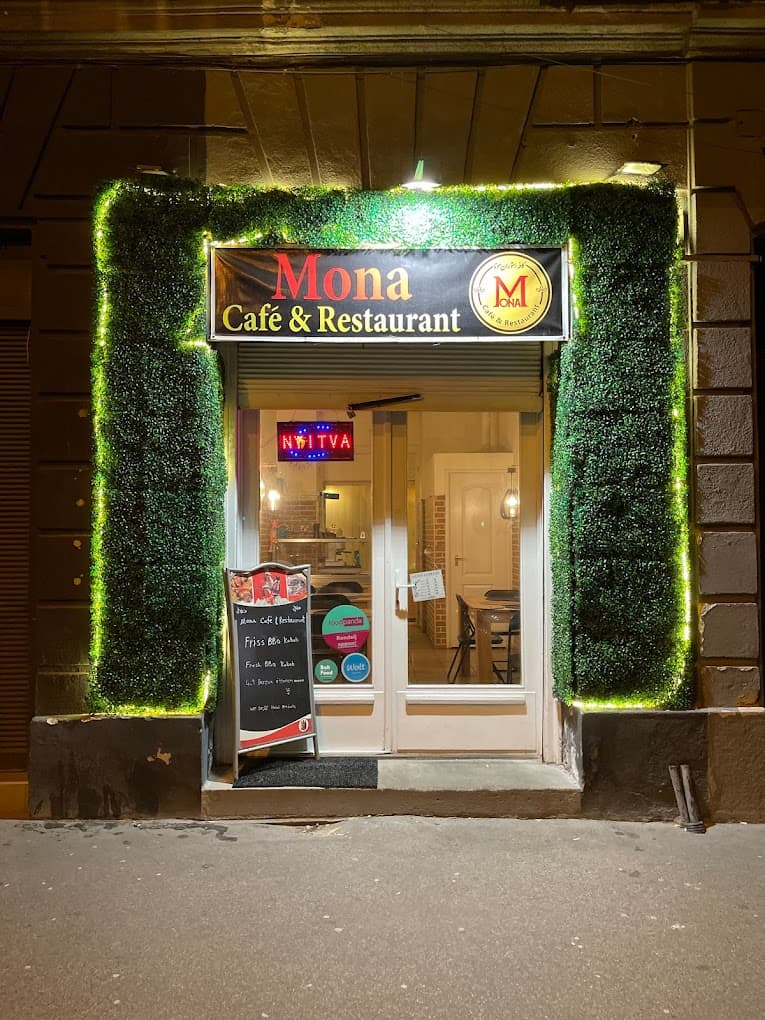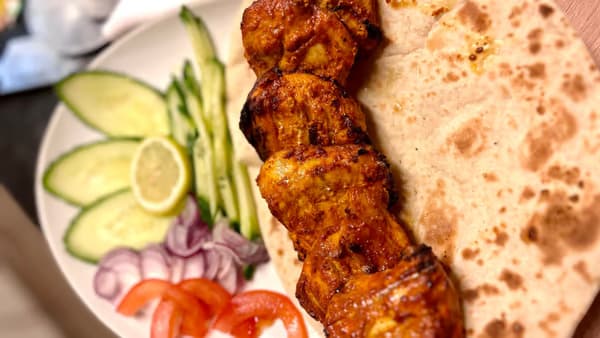One July evening, I crossed Baross Street coming from Szigetvár st., and on the other side, I noticed an entrance that stood out from its surroundings, framed with artificial grass(!). A quick check on Google Maps revealed it to be a Pakistani restaurant, and inside, people who seemed to be of Pakistani origin were sitting at the tables. An Asian restaurant with Asian guests? That’s always a good sign, so I didn’t think twice about giving it a try.

Inside, there’s room for about 15 people, and it’s more of a hybrid between a buffet and a restaurant, which, I think, gives it a – pardon the cliché – cozy and family-like atmosphere. No one will feel out of place here. On that evening, about half of the tables were empty. A few minutes later, they took my order with extraordinary but not pushy friendliness, and all the guests – evidently on friendly terms with the staff – smiled encouragingly at me.
Considering the raging inflation and downtown buffets, the prices are partly average but mostly on the lower side. The food, however, doesn’t come out quickly, so be prepared for a bit of a wait. In return, during all three of my visits – I like to eat at a place several times before writing about it – the food was nearly perfect.
On the first evening, I ordered a mixed plate with four different BBQ chicken seasonings because they were out of lamb. Speaking of friendliness, I mentioned that I should watch my calorie intake lately, so I’d skip the rice and chapati (Pakistani flatbread) and would prefer a vegetable side, if possible. It was possible. Moreover, they responded with a cheerful “no problem, sir.”
It was perfect. The seasoning on the tender meat caramelized beautifully, and you could see and taste that it wasn’t made from a pre-made spice mix. It had the necessary smokiness, but it was adjusted to European tastes in terms of (less) spiciness.

A few weeks later, I tried their popcorn chicken – it seems to be popping up more often in the city. Golden brown, crispy coating (the trick of which I later found out), minimal seasoning, intentionally I assume, because the dominant flavor is the accompanying herby, yogurt-based dip.
Next time, I ordered a smaller BBQ with mango seasoning, this time with chapati – my willpower wasn’t holding up. I liked this one the most from the last dish, maybe because the seasoning was the most intense.

Three out of three times, above-average performance. Let’s take a look behind the counter!
The owner, chef, and waiter all in one is Awais from Pakistan, specifically from the region of Punjab, out of the current four regions.
For those who might not know, the names of the formerly Indian, Muslim-majority provinces are: Punjab, Afghanistan, Kashmir, Islamabad, Sindh, and Balochistan.
The population has doubled in the last 30 years (231 million in 2021).
Over the past 20 years, the economic situation has continuously worsened, and it is currently teetering on the brink of bankruptcy.
Beside that Pakistan is one of the most beautifull country in South Asia.

Awais, what is your original profession?
Actually, I am an accountant. My studies are related to accounting and business finance. Later, I even worked as an accountant. For 2 years continuously in Saudi-Arabia I was a personal accountant and business manager of the CEO of Saudi Airlines, Mr. Ali Alashban.
That sounds quite impressive.
Yes, I handled his business, he had a coffee chain business. I learned a lot from it. I can say that he was a significant inspiration to me. When I came out of university, I had no idea about anything going on in the corporate world. He taught me how to make a good business, and how to negotiate. I learned from him that courage and self-confidence are essential for investments. I gained that self-confidence from him as well.
I learned a lot about hospitality too. I supervised the coffee shops and restaurants, worked closely with the managers, and learned a lot from them as well. I also started taking some hospitality classes because it was part of my field. I went to some seminars and workshops to learn how to handle guests, how to remain calm even when a guest is angry. Dissatisfied customers are always there, even in 5-star hotels. They say that if everything is fine, you don’t hear about it unless something goes wrong.
So, I could have had a successful career there. I had a lot of autonomy in many aspects, but it wasn’t my own, so at the end I decided to make my own. I think it’s much more, you know, free spirit.
These hospitality workshops must have proven especially useful in hindsight.
Yes, that’s right.
I’m sure it was a big change to move from Pakistan to Saudi Arabia.
Yes, it was a real culture shock. It was somewhat similar, of course, but everything was “bigger,” “more,” and there were many rules and restrictions, both for locals and foreigners. Things are changing now, but in 2017 at that time it was very strict about the rules and regulations, especially for foreigners.
For example, you cannot start your own business alone. You need someone local as your partner. So, I never planned a business there. That was the reason I thought I should move somewhere where I can do my own business because in Saudi Arabia you need a sponsor or a person who is a local guy.
I knew Pakistan wouldn’t have been a good choice because it can take a lot of time for a business to grow there. I have friends who do business there and they are successful too but it’s hard for them to expand it globally, it’s very difficult to deal with the exchange rates, specially imports get affected because the Pakistani rupee fluctuates a lot. That’s why I looked for another country.
Who taught you how to cook?
Honestly, I started learning in Saudi Arabia. Since I oversaw checking bills of ingredients for the chefs, I regularly asked them why they needed certain things. What food they used them for and how much they used. That’s when I saw how much it costs, for example, to make a certain type of pasta.

From the current perspective, this turned out to be quite useful, I assume.
Yes, indeed. I was genuinely interested, and it was also very helpful to live in the same house as the chefs. We saw how they cooked, and I became more and more interested in what and how they prepared.
You mean you lived in an apartment with the chefs?
I was born in a chef’s home too . My grandfather, the late Nazir Hussain was a great chef of his time and he was a contractor of companies to supply good and budgeted food to labor. His father (my great grandfather) was also a chef in the British army. I have heard these stories of food and restaurant management from my childhood.
But practically working in the kitchen, Yes the chefs I met in Saudi Arabia they taught me a lot. I wasn’t married yet. We employees lived together in a 6-7 room villa. After some time in Saudi Arabia I missed my mom’s food so much that I asked them to show me how they make their food at home because Indian and Pakistani flavors are very similar.
I see. What happened next?
Then I came to Hungary and then I worked properly in a restaurant for 2 years as a chef. First, I was a kitchen helper. It was also a new business. It was a new challenge for me and something happened there also. Like the owners had to go to India for 3 months. He said I am going, and we have to close the business. The chef and I were afraid we would lose our jobs, so I told him that I have worked in hospitality, and I know the business and everything, and I will run your business. I told him I worked in Saudi Arabia. I was running 3 branches. I can do these things. Trust me, I can, so you don’t have to worry. I will see the customers.
So, I managed the business, handled the customers, and helped the chef. By the end of the third month, we had significantly increased the previous revenue level, which had a big impact on the owner.
I’m sure it did.
Yes, he was so impressed by everything that he hired me as a permanent employee changed my visa. Since I had already learned the basics of cooking and even some tricks from the chefs in Saudi Arabia, I just needed to continue to develop here.
These tricks sound exciting! Could you share a few?
Yeah. Here we have chicken biryani. I’ve been eating biryani since I was born. The authentic version, of course, has a special smell of charcoal, because it used to be cooked on wooden fire. But if you don’t have one, just take an aluminum foil, burn a coil and put some oil on it put it in the food. This way the food will smell like charcoal, and it will give it that barbecue flavor to your chicken and everything.
That’s definitely a good one!
Or to make the fried chicken coating not only delicious but also attractive. We have to put in corn flour, eggs, because it should be crunchy. That guy tells me if you put eggs in it, it will get dark. You should just dip it in the water or else the whole piece will look burnt. So instead of egg, use a little water. And for the flour, you need to coat it roughly. That makes the breadcrumbs chunkier and even crispier. But these are just a few examples. I could probably tell you 50 more tricks because I was living with them. They taught me a lot too because we were always discussing these things everyday.
Why did you choose Hungary specifically?
To be honest, it was the easiest option. To obtain the same immigrant status in Germany as I did here, I would have had to learn German to a certain level. I didn’t have time for that. And going to England would have cost around £18,000 for the same thing. In Hungary, I just had to take a test at a university, they checked my papers, and I was all set.

When did you arrive precisely?
In February 2019. I actually started planning this back in June 2018. I wanted to move to a free country where I could start my own business because even in Dubai in the Arabian Gulf, you needed a local sponsor for that.
Back to the restaurant! Is there a difference in how you cook for guests here compared to at home? I mean, do you adjust the dishes for the European taste, like making them less spicy, etc.?
Yes, in my home for sure, I cook spicier dishes. But there’s also a difference because we use different equipment here in the restaurant and we prepare much larger quantities at once. At home, I’m less concerned about doing everything properly. For example, in the restaurant, we would never serve tomatoes that are not peeled. You know, it looks entirely different, also the food made by using peeled tomatoes is much creamier and smoother. At home, I just slice them and don’t pay much attention to them. And of course, the presentation is entirely different here than at home, where I don’t focus on that aspect.
What is your favorite dish on the menu?
Chicken Biryani. Many places make it, but the way I make it is entirely different. It always includes caramelized onions, which give a unique flavor to both the rice and the meat.
Why is Mona Cafe called Mona?
That was the name when I bought it. Initially, I thought about changing it, but there was so much to do around the opening, and I was so busy that I didn’t end up changing it. Ultimately, the goal is to generate profit, and I had no issues with the name. It’s a friendly name. Besides, my wife’s name is Mahrukh, and her parents used to call her Mona. So, no name was better than that.
It’s almost like a sign from above!
Yes, it is. It used to be a well-established Persian restaurant, and from a marketing perspective, it was good to keep the name.
Do you and your wife work together? Could this be considered a family business?
No, she only arrived in Budapest last year, so she doesn’t have much social activities here. So, to spend more time together, she often comes here. During those times, she helps in the kitchen, or she brings the groceries or stuff for me I need locally.
For work I have my partners to work with me on business stuff.
Is he the one you worked with at the previous place?
Nope, we didn’t work together in the kitchen before. But we are friends because of this common interest of cooking
If someone comes to your restaurant for the first time, what would you recommend to them?
If they like something spicy, I’d recommend Chicken Masala or Chicken Curry. If they prefer something less spicy and enjoy rice dishes, the chicken or lamb biryani. If they don’t want meat, then Paneer Tikka Masala or vegetable curry.
What’s the most popular dish?
The biryanis, tikka masala, and chicken curry.
What do you love in this business the most?
Meeting new people, getting to know them, and cooking delicious food for them. Some customers have become friends, and there are those who spend hours here. I even know some of them by name. Every day brings challenges that need to be solved. They might not be significant issues, but it feels good when I resolve them.
What is it that you like less about it? I mean like you have to work 6 days a week and things like this.
Yes, it’s hard work. Like you have to be 100% to give 100% to the customer. I keep thinking about how to make the dishes better. Behind every dish, their ingredients, they are suppliers. There is my budget also. So I have to see which thing can be possible from the cost, business side to.
Speaking of suppliers, where do you source your ingredients?
Some of them come from regular restaurant suppliers, but for chicken breast, for example, we get a special, very high-quality one. We also buy vegetables hand-picked from small producers at local markets, always opting for freshness.
If you had to highlight one thing, why should people come to your restaurant?
Because this kind of authentic, special biryani we make here, you won’t find anywhere else in the city and our service too. Our hospitality and passion behind serving every guest is also a key thing which will give customers a special experience here.